六年级英语上册各单元知识点归纳及练习【PEP】
PEP英语六年级上册各单元知识点归纳及练习

第一单元① 询问交通方式用疑问代词how⏹—— How do you go to school ? 你怎样去上学?—— I go to school on foot . 我走路去上学。
⏹—— How do you go to Canada ? 你怎么去加拿大。
—— I go by plane . 我坐飞机去。
⏹—— How does your father go to work ? 你父亲怎样去上班? —— He goes to work by subway . 他坐地铁去上班。
② 询问地点,用疑问代词where⏹—— Where is your home ? 你家在哪里? —— It’s near the post office . 在邮局旁边。
⏹—— Where are the teachers ? 老师们在哪儿? —— They are in the teacher’s office . 在老师的办公室。
③ 问路⏹—— How can I get to Zhongshan Park ? 我怎么去中山公园? —— You can go by the No.1 bus.You can take the No .1 bus .④ 交通规则(traffic rules )⏹ Stop at a red light . 红灯停 ⏹ Wait at a yellow light . 黄灯停 ⏹Go at a green light . 绿灯行1.Where is the cinema, please? 请问电影院在哪儿?next to the hospital. 在医院的旁边。
in front of the school. 在学校的前面.behind the park 在公园的后面It’s near the zoo. 在动物园的附近.on the right/left of the bookstore. 在书店的左/右边.east of the bank. 在银行的东边.far from here. 离这儿很远.2. Excuse me, is there a cinema near here 请问这附近有电影院吗?Yes, there is / No, here isn’t. 有 / 没有3. How can I get to the hospital? 我该怎样到达医院呢?You can go …二、指引路1. You can go by the No.312 bus. 你可乘坐312路公交车去那儿.2. Get on / off at the …在…地方上车/ 下车.3. Walk straight for three minutes. 向前直走在分钟.4. Turn right/ left at the …在…地方向右/ 左转.5. Walk east/ west/ south/ north for … minutes.朝东/ 西/南/北/ 走…分钟.三 Is it far from here? 离这儿远吗?Yes, it is. / No, it isn’t. 是的,很远 / 不是,不远。
PEP英语六年级上册各单元知识点归纳及练习

Book6 A Unit 1 How Do You Go There ?一. 知识点归纳(一)、 词汇bike ( 自行车乘坐)公共汽车(脚) 火车(怎样) 飞机(去上学) 轮船)地铁) (交通工具前加by , 表示乘坐。
步行要用on foot )第五 remember 记住 find 找到不同 same 相同的 every 每个, 所有的三会 mean 意思是 drive 驾驶side 边 England 英国澳大利亚 however 但是 left 左边必须●反义词:near(近的)—far(远的) fast(快的)—slow(慢的) same(相同的)—different(不同的)why(为什么) —because(因为) get on(上车)---get off(下车)●近义词:see you---goodbye next to ---near●频度副词:always 总是,一直 usually 通常 often 经常 sometimes 有时候 never 从来不(二)、重点句型① 询问交通方式用疑问词how⏹—— How do you go to school ? 你怎样去上学? —— I go to school on foot . 我步行去上学。
⏹—— How do you go to Canada ? 你怎么去加拿大。
—— I go by plane . 我坐飞机去。
⏹ ——go to work ? 你父亲怎样去上班?—— . 他坐地铁去上班。
(注意三单形式)② 询问地点,用疑问词where⏹—— Where is your home ? 你家在哪里? —— It’s near the post office . 在邮局旁边。
⏹ —— Where are the teachers ? 老师们在哪儿?—— T hey are in the teacher’s office . 在老师的办公室。
六年级上册英语知识点总结归纳(PEP新版)
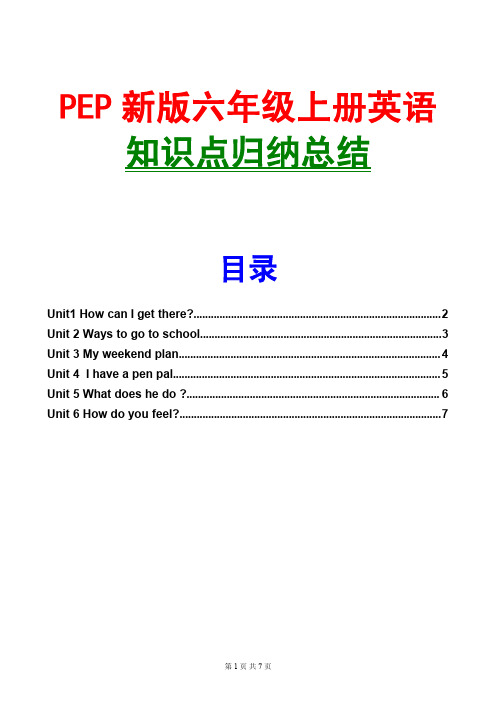
PEP新版六年级上册英语知识点归纳总结目录Unit1How can I get there? (2)Unit2Ways to go to school (3)Unit3My weekend plan (4)Unit4I have a pen pal (5)Unit5What does he do? (6)Unit6How do you feel? (7)Unit1How can I get there?library图书馆north(北)post office邮局hospital医院turn left左转turn right右转places:cinema电影院(地点)bookstore书店(东)east west(西) science museum科学博物馆pet hospital宠物医院crossing十字路口school学校south(南)shoe store/shop鞋店supermarket超市go straight直行一、问路1.Where is the cinema,please?请问电影院在哪儿?next to the hospital.在医院的旁边。
in front of the school.在学校的前面.behind the park在公园的后面It’s near the zoo.在动物园的附近.on the right/left of the bookstore.在书店的左/右边.east of the bank.在银行的东边.far from here.离这儿很远.2.Excuse me,is there a cinema near here请问这附近有电影院吗?Yes,there is./No,there isn’t.有./没有。
3.How can I get to the hospital?我该怎样到达医院呢?Take the No.57bus.乘坐57路公汽。
二、指引路1.You can take the No.312bus.你可乘坐312路公交车去那儿.2.Go straight for three minutes.向前直走3分钟.3.Turn right/left at the…在…地方向右/左转.4.Walk east/west/south/north for…minutes.朝东/西/南/北/走…分钟.三、Is it far from here?离这儿远吗?Yes,it is./No,it isn’t.是的,很远/不是,很远。
小学英语PEP六年级上册4-6单元知识点总结
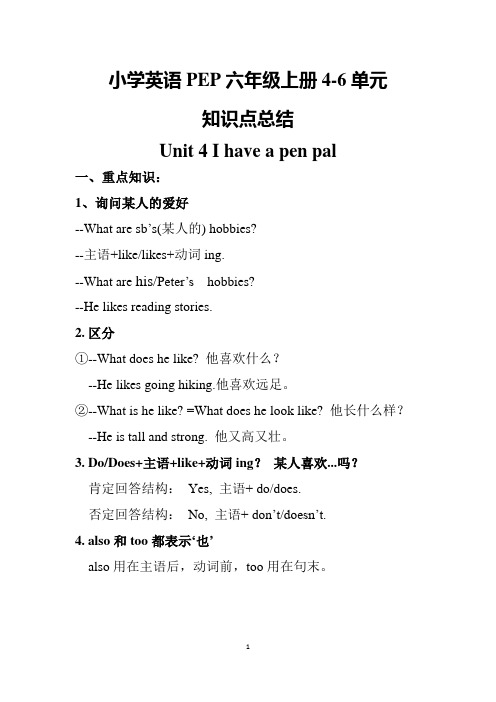
小学英语PEP六年级上册4-6单元知识点总结Unit 4 I have a pen pal一、重点知识:1、询问某人的爱好--What are sb’s(某人的) hobbies?--主语+like/likes+动词ing.--What are his/Peter’s hobbies?--He likes reading stories.2.区分①--What does he like? 他喜欢什么?--He likes going hiking.他喜欢远足。
②--What is he like? =What does he look like? 他长什么样?--He is tall and strong. 他又高又壮。
3.Do/Does+主语+like+动词ing?某人喜欢...吗?肯定回答结构:Yes, 主语+ do/does.否定回答结构:No, 主语+ don’t/doesn’t.4.also和too都表示‘也’also用在主语后,动词前,too用在句末。
5.宾语6.区别What is his hobby?(单数)What are his hobbies?(复数)7.be interested in对...感兴趣二、动词变三单:1、一般情况是在动词后加-s如:read - reads,write - writes,say – says2、以s,x,ch,sh,结尾的词加-es如:teach - teaches,wash - washes,3、①以辅音字母+y结尾的词变y为i再加-es如:try - tries②元音直接+s如:play -plays4、不规则变化如:have- has go-goes do-does三、动词ing变化规则:1、一般情况下,直接在动词后加-ing如:study ----- studying2、以不发音的e结尾,要去e加ing如:take - taking make -- making dance ---- dancing3、双写词尾字母,再加-ing如:run ----- runningswim----swimmingshop-shopping四、如何把肯定句变成一般疑问句1.如果有be动词和情态动词,直接把他们放在句首,I,we变成you2.句中没有be动词和情态动词,则根据主语借助do/does,后面的动词用原形(I,we变成you,主语是三单才用does 其他用do)补充:be动词包括am,is,are;情态动词:can,must,will,should五.如何变否定句1.句中有be动词或情态动词直接在其后加not2.句中无be动词或情态动词,根据主语用don’t或doesn’t 放在主语后,且后面的动词用原形。
新版PEP小学英语六年级上册1-6单元知识点总结
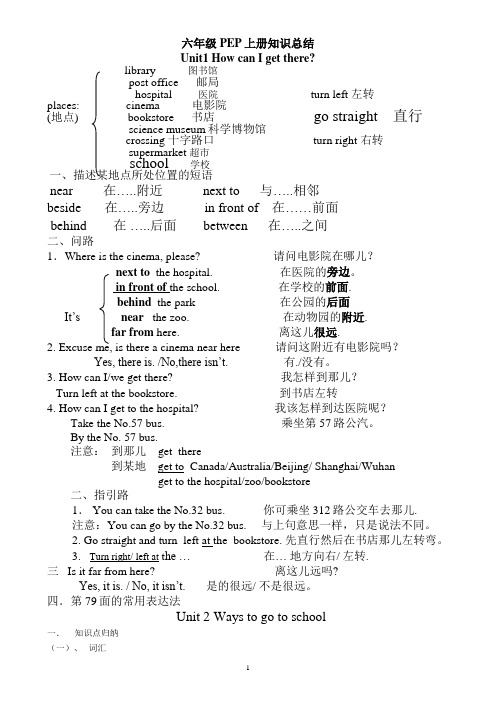
六年级PEP上册知识总结Unit1 How can I get there?library 图书馆post office 邮局hospital 医院turn left 左转places: cinema 电影院(地点) bookstore 书店go straight 直行science museum科学博物馆crossing 十字路口 turn right 右转supermarket 超市school 学校一、描述某地点所处位置的短语near 在…..附近 next to 与…..相邻beside 在…..旁边 in front of 在……前面behind 在…..后面 between 在…..之间二、问路1.Where is the cinema, please? 请问电影院在哪儿?next to the hospital. 在医院的旁边。
in front of the school. 在学校的前面.behind the park 在公园的后面It’s near the zoo. 在动物园的附近.far from here. 离这儿很远.2. Excuse me, is there a cinema near here 请问这附近有电影院吗?Yes, there is. /No,there isn’t. 有./没有。
3. How can I/we get there? 我怎样到那儿?Turn left at the bookstore. 到书店左转4. How can I get to the hospital? 我该怎样到达医院呢?Take the No.57 bus. 乘坐第57路公汽。
By the No. 57 bus.注意:到那儿 get there到某地 get to Canada/Australia/Beijing/ Shanghai/Wuhanget to the hospital/zoo/bookstore二、指引路1. You can take the No.32 bus. 你可乘坐312路公交车去那儿.注意:You can go by the No.32 bus. 与上句意思一样,只是说法不同。
(完整word版)pep六年级上册英语-各单元知识点总结
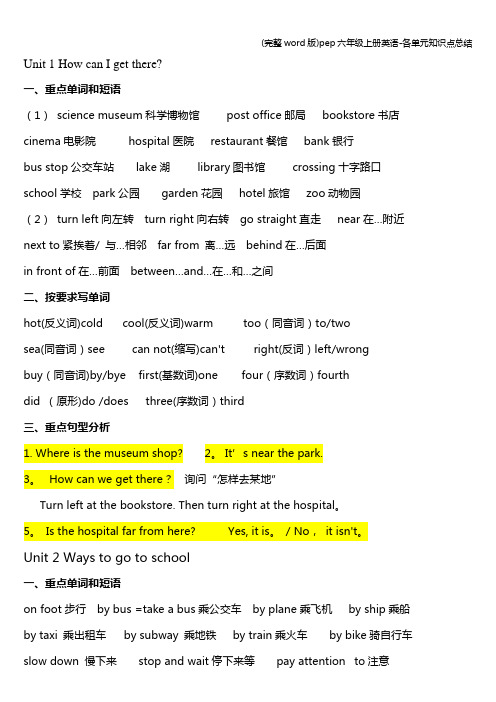
Unit 1 How can I get there?一、重点单词和短语(1)science museum科学博物馆post office邮局bookstore书店cinema电影院hospital医院restaurant餐馆bank银行bus stop公交车站lake湖library图书馆crossing十字路口school学校park公园garden花园hotel旅馆zoo动物园(2)turn left向左转turn right向右转go straight直走near在…附近next to紧挨着/ 与…相邻far from 离…远behind在…后面in front of在…前面between…and…在…和…之间二、按要求写单词hot(反义词)cold cool(反义词)warm too(同音词)to/twosea(同音词)see can not(缩写)can't right(反词)left/wrongbuy(同音词)by/bye first(基数词)one four(序数词)fourthdid (原形)do /does three(序数词)third三、重点句型分析1. Where is the museum shop? 2。
It’s near the park.3。
How can we get there?询问“怎样去某地”Turn left at the bookstore. Then turn right at the hospital。
5。
Is the hospital far from here? Yes, it is。
/ No,it isn't。
Unit 2 Ways to go to school一、重点单词和短语on foot步行by bus =take a bus乘公交车by plane乘飞机by ship乘船by taxi 乘出租车by subway 乘地铁by train乘火车by bike骑自行车slow down 慢下来stop and wait停下来等pay attention to注意cross the road横穿马路traffic light通信号灯at home在家look right向右看look at朝…看play with和…一起玩二、按要求写单词go (反义词)come foot(复数)feet child(复数)childrenearly(反义词)late good(反义词)bad take(反义词)bringslow(反义词)quick/fast go(过去式)went do(过去式)diddo(第三人称单数) does go(第三人称单数)goessame 相同的(反义词)different不同的miss(过去式)missedwrong 错误(反义词)right正确can(否定形式)can’t三、重点句型分析1。
人教版(PEP)小学六年级上册英语知识点【三、四、五单元】

人教版(PEP)小学六年级上册英语知识点【三、四、五单元】Unit3Whatareyougoingtodo?一、重点短语:thismorning今天上午thisafternoon今天下午thisevening今天晚上nextweek下周tomorrow明天tonight今晚postcard明信片comicbook漫画书newspaper报纸二、重点句型:1.Whatareyougoingtodoontheweekend?你周末打算做什么?2.I’mgoingtovisit mygrandparentsthisweekend?这个周末我打算去看望我的外祖父母。
3.Whereareyougoingthisafternoon?你今天下午打算去哪里?4.I’mgoingtothebookstore.我打算去书店。
5.Whatareyougoingtobuy?你打算去买什么?6.I’mgoingtobuyacomicbook.我打算去买一本漫画书。
三、重点语法:1、Whatareyougoingtodo你想做什么询问他人在未来的打算。
begoingto后面要跟动词的原形。
注意begoingtobe意思是"打算成为什么,干什么职业。
"注意一下句子的区别,找出正确回答。
WhatareyougoingtodothisafternoonWhatareyougoingtobuyWhatare yougoingtobeWhenareyougoingWhereareyougoingHowareyougoingWh oareyougoingwith2、thisevening和tonight的区别:thisevening指的是今天晚上睡觉以前的时间,一般指晚上十二点以前。
而tonight指的是今晚,一般是指一整晚的时间,通宵。
3、部分疑问代词的意义与用法:(1)What什么。
用来问是什么,做什么,叫什么,什么样等等。
PEP英语六年级上册各单元知识点归纳及练习
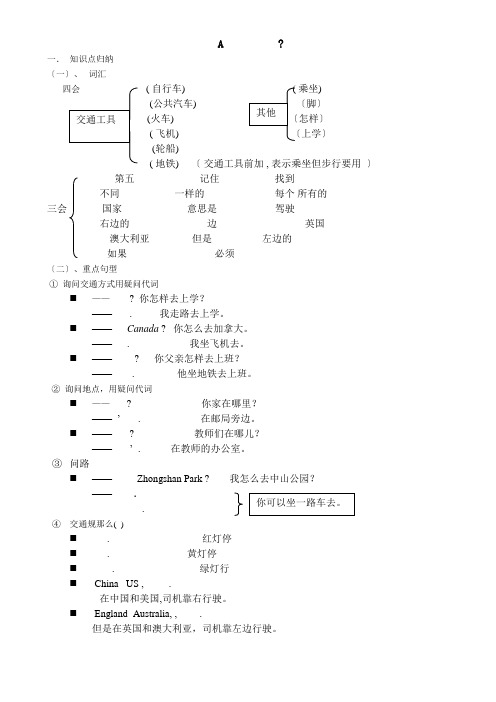
A ?一. 知识点归纳 〔一〕、 词汇( 自行车乘坐)公共汽车火车 飞机 轮船)地铁) 〔 交通工具前加 , 表示乘坐但步行要用 〕第五 记住 找到不同 一样的 每个 所有的三会 国家 意思是 驾驶右边的 边 英国 澳大利亚 但是 左边的 如果 必须〔二〕、重点句型① 询问交通方式用疑问代词⏹ —— ? 你怎样去上学?—— . 我走路去上学。
⏹ —— Canada ? 你怎么去加拿大。
—— . 我坐飞机去。
⏹ —— ? 你父亲怎样去上班?—— . 他坐地铁去上班。
② 询问地点,用疑问代词⏹ —— ? 你家在哪里?—— ’ . 在邮局旁边。
⏹—— ? 教师们在哪儿? —— ’ . 在教师的办公室。
③ 问路⏹ —— Zhongshan Park ? 我怎么去中山公园?—— ..④ 交通规那么( )⏹ . 红灯停 ⏹ . 黄灯停 ⏹ . 绿灯行 ⏹ China US , .在中国和美国,司机靠右行驶。
⏹England Australia, , .但是在英国和澳大利亚,司机靠左边行驶。
一、根据答句写问句或根据问句以及所给的信息写答句。
A?: .?: .A?: .A?: Shanghai .A?: .? ( 地铁).? 〔走路〕.? 〔坐路公共汽车〕.二选择适当的词完成短文, , , , , , , , , ,. “〞 , China England , .三完成对话: , , ?: , .: ?: , ’ .: ?: .: ?: . .: .: .四完成句子..China ... ’ .?词汇图书馆 (北)邮局医院: 电影院(地点) 书店 (东) (西)科学博物馆银行学校(南)超市鞋店在哪里请及…相邻右边,正确的左边成直线地然后转弯对不起想要双分钟告诉乘坐远放学以后上车下车第十二聚会;晚会开场买句型一、问路. , ? 请问电影院在哪儿?. 在医院的旁边。
. 在学校的前面.在公园的后面’ . 在动物园的附近.. 在书店的左右边.. 在银行的东边.. 离这儿很远.. , 请问这附近有电影院吗?, . 有.. ? 我该怎样到达医院呢?…二、指引路. . 你可乘坐路公交车去那儿.. …在…地方上车下车.. . 向前直走在分钟.. …在…地方向右左转.. … .朝东西南北走…分钟.三 ? 离这儿远吗?, . , ’.一根据对话中上下文意思,在空格中填上适宜的词使句子完整。
人教PEP版小学英语六年级上册Unit1-6单元知识小结-全册完整版
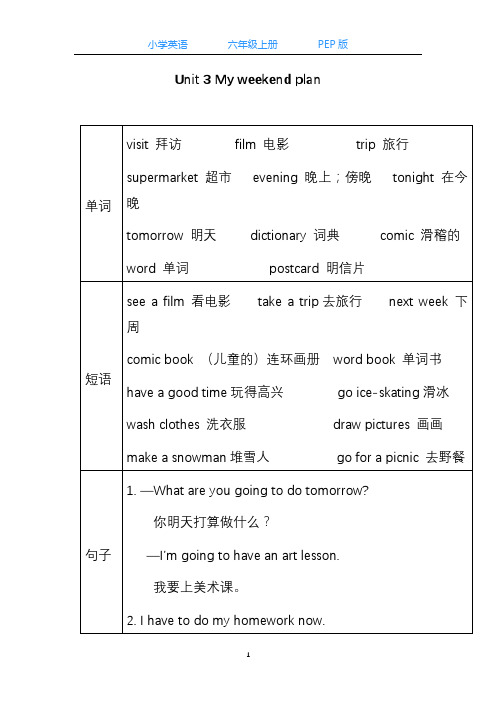
Unit 3 My weekend planUnit 4 I have a pen palUnit 5 What does he do?Unit 6 How do you feel?Unit 1 How can I get there?Unit 2 Ways to go to schoolPEP小学英语六年级上册重点单词和句型练习一、重点单词Unit 1:by ( ) foot( ) bike( ) bus( ) train( ) how( ) go to school() traffic()traffic light()traffic rule()stop()wait() get to()Unit 2library( ) post office( ) hospital( ) cinema( ) turn( ) bookstore( ) where( ) please( )next to( ) right ( ) left( ) straight( )then ( )Unit 3next week( ) this morning( ) this afternoon( )this evening ( ) comic book( ) post card( )newspaper( ) buy( )Unit 4hobby( ) ride a bike--riding a bike( ) dive--diving( )play the violin—playing the violin( ) make kites—making kites( ) collect stamps—collecting stamps( ) live –lives( ) teach--teaches( ) go--goes( ) watch--watches( ) read--reads( ) does doesn’t=does not Unit 5singer( ) writer( ) actor( ) actress( ) artist( ) TV reporter( ) engineer( ) accountant( ) policeman( ) salesperson( )cleaner( ) where() work()Unit 6rain( ) cloud ( ) sun( ) stream( ) come from( ) seed( ) soil( ) sprout ( ) plant( )should ( ) then( )Unit 1: ▁▁(经,乘) ▁▁(脚) ▁▁(自行车) ▁▁(公共汽车) ▁▁(火车)▁▁(怎样) ▁▁▁▁(上学)▁▁▁▁(交通)▁▁▁▁▁▁(交通灯)▁▁▁▁▁▁(交通规则)▁▁(停,停车站)▁▁(等待)▁▁▁▁(到达)Unit 2 ▁▁▁▁(图书馆) ▁▁▁▁(邮局) ▁▁▁▁(医院) ▁▁▁▁(电影院)▁▁(转弯) ▁▁▁▁(书店) ▁▁▁(在哪里,到哪里) ▁▁▁(请)▁▁▁(与…相邻) ▁▁▁ (右边) ▁▁(左边) ▁▁▁(成直线地) ▁▁▁(然后)Unit 3 ▁▁▁▁▁(下周) ▁▁▁▁▁(今天上午) ▁▁▁▁▁(今天下午) ▁▁▁▁ (今天晚上) ▁▁▁▁(漫画书) ▁▁▁▁(明信片) ▁▁▁▁ (报纸) ▁▁▁(购买)Unit 4▁▁▁(爱好) ▁▁▁▁▁--▁▁▁▁▁▁(骑自行车) ▁▁▁--▁▁▁(跳水) ▁▁▁▁▁▁—▁▁▁▁▁▁▁(拉小提琴) ▁▁▁▁▁—▁▁▁▁▁▁▁(制作风筝) ▁▁▁▁▁▁—▁▁▁▁▁▁(集邮) ▁▁▁–▁▁▁(居住)▁▁▁▁--▁▁▁▁(教) ▁▁--▁▁▁(去) ▁▁▁--▁▁▁(看)▁▁--▁▁▁(读,看) does doesn’t=▁▁▁▁Unit 5▁▁▁▁(歌唱家,歌手) ▁▁▁▁(作家) ▁▁▁▁(男演员) ▁▁▁▁(女演员) ▁▁▁▁(画家) ▁▁▁▁(电视台记者) ▁▁▁▁(工程师) ▁▁▁(会计) ▁▁▁▁(男警察) ▁▁▁▁▁▁(销售员) ▁▁▁(工作)▁▁▁▁(清洁工) ▁▁▁▁(在哪里,到哪里)Unit 6▁▁▁(雨) ▁▁▁ (云) ▁▁▁(太阳) ▁▁▁▁(河,溪) ▁▁▁▁(来自,从…来) ▁▁▁(种子) ▁▁▁(土壤) ▁▁▁ (苗,芽) ▁▁▁(植物,种植) ▁▁▁(应该) ▁▁▁▁(然后)二、单词分类1)交通方式:by bus, by train, by subway, by ship, by plane, by car, on foot2)文具书籍:dictionary, newspaper, comic book, post card3)职业:singer, writer, TV reporter, actor, actress, engineer, accountant, salesperson, policeman, policewoman,artist, cleaner4)V-ing形式:riding a bike, collecting stamps, diving, making kites, playing the violin5)第三人称单数形式:lives,teaches, watches, goes, does, doesn’t6)公共场所:library,post office, cinema, hospital, science museum, bookstore7)方位:east, west, south, north, turn left, turn right, go straight8)交通灯; red light, yellow light, green light9)自然:sun, cloud, rain, vapour, stream六年级上册四会句子1.你是怎样去上学的?▁▁▁▁▁▁▁▁2.通常我走路去上学。
人教版PEP 英语六年级上册 全册各单元知识点总结

人教版PEP 英语六年级上册全册各单元知识点总结Unit 1 How can I get there?一、地点词汇在问路时,掌握一些地点词汇是必要的,这些词汇包括library(图书馆)、post office(邮局)、XXX)、cinema(电影院)、bookstore(书店)、supermarket(超市)、school (学校)等等。
二、描述某地点所处位置的短语在描述某地点所处位置时,可以使用一些短语,如near (在…。
附近)、next to(与…。
相邻)、XXX(在…。
旁边)、in front of(在……前面)、behind(在…。
后面)、een(在…。
之间)等等。
三、问路当我们不知道某个地方在哪儿时,可以问路。
问路时,我们可以使用一些常用的句型,如“Where is the cinema。
please?”(请问电影院在哪儿?)、“Excuse me。
is there a cinema near here?”(请问这附近有电影院吗?)、“How can I get there?”(我怎样到那儿?)等等。
四、指引路当我们知道了某个地方的位置后,我们需要指引路。
指引路时,我们可以使用一些常用的短语,如“You can take the No.32 bus.”(你可乘坐312路公交车去那儿)、“Go straight and turn left at the bookstore.”(先直行然后在书店那儿左转弯)、“Turn right/ left at the …”(在…地方向右/左转)等等。
Unit 2: Ways to Go to SchoolDo you live far from school。
You may need to choose a XXX method to get there。
Here are some common n tools you can use: bike。
人教版(PEP)小学英语六年级上册各单元知识点归纳(三年级起点)
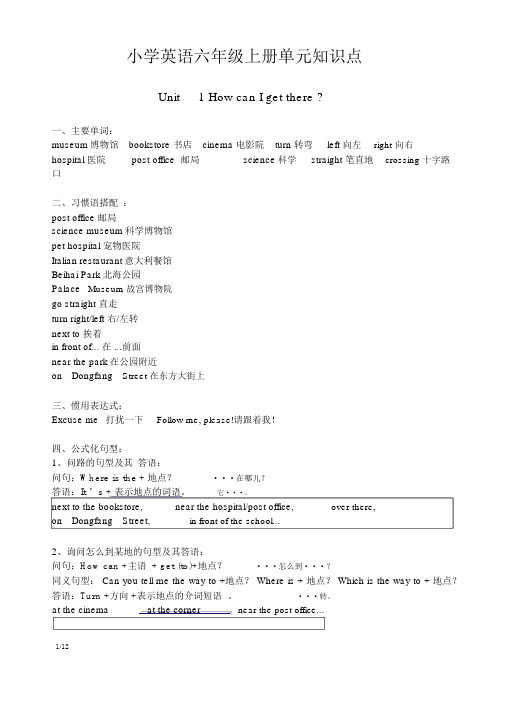
小学英语六年级上册单元知识点Unit 1 How can I get there ?一、主要单词:museum博物馆bookstore 书店cinema 电影院turn 转弯left 向左right 向右hospital 医院post office 邮局science科学straight 笔直地crossing 十字路口二、习惯语搭配:post office 邮局science museum科学博物馆pet hospital 宠物医院Italian restaurant意大利餐馆Beihai Park 北海公园Palace Museum 故宫博物院go straight 直走turn right/left 右/左转next to 挨着in front of... 在 ...前面near the park在公园附近on Dongfang Street 在东方大街上三、惯用表达式:Excuse me打扰一下Follow me, please!请跟着我!四、公式化句型:1、问路的句型及其答语:问句:Where is the + 地点?···在哪儿?答语:It ’s + 表示地点的词语。
它···。
next to the bookstore,near the hospital/post office,over there,on Dongfang Street,in front of the school...2、询问怎么到某地的句型及其答语:问句:How can +主语 + get (to)+地点?···怎么到···?同义句型: Can you tell me the way to +地点? Where is + 地点? Which is the way to + 地点?答语:Turn +方向 +表示地点的介词短语。
(完整版)新版pep六年级上册英语-各单元知识点总结

Unit 1 How can I get there?一:重点单词和短语Science科学, museum博物馆, post office , bookstore, cinema, hospitalLondon Eye伦敦眼, stomach胃, crossing十字路口, turn left, turn right,go straight=walk straight直走. next to紧挨着/与...相邻far from(离...远),near在...附近behind(在...后面)in front of(在...前面)between…and…(在...和...之间)二:按要求写单词:hot(反义词)cold , cool(反义词)warm,too(同音词)to/two can not(缩写)can’tright(反义词)left/wrong buy(同音词)by/bye sea(同音词)see first(基数词)onefour(序数词)fourth did (原形)do /does three(序数词)third give(过去式)gave三:重点句型分析1. Where is the museum shop?此问句是由特殊疑问词where 引导的一个特殊疑问句,where意为“在哪里,到哪里”,用来询问地点,放在句子的开头。
询问“某人或某物在哪里”的基本句型是:“ Where +is/are+ 主语?”,where is 后接名词或代词的单数形式,where are 后接名词或代词的复数形式。
表示地点的词:museum博物馆, post office 邮局, bookstore书店, cinema电影院, hospital医院restaurant餐馆bank银行bus stop公交车站lake湖library 图书馆zoo动物园school学校park公园garden花园hotel旅馆2. It’s near the door.此句中near是表示位置的介词,意为“旁边,附近” ,其同义句是:It’s next to the door.它在门的旁边。
人教版(PEP)六年级上册英语各单元知识点

人教版(PEP)六年级上册英语各单元知识点Unit 1 How can I get there?主要单词:post office 邮局hospital医院cinema 电影院bookstore书店science museum科学博物馆turn left向左转turn right 向右转go straight 直行 crossing十字路口主要句子:☆1、☆Where is the museum shop?博物馆的商店在哪儿?☆☆2、It’s near the door. 在大门附近。
☆3、I want to buy a postcard. 我想买一张明信片。
4、I want to send it today. 我想今天寄出。
5、I’ll ask. 我去问问。
6、Wow, a talking robot! 哇!一个讲话机器人。
7、What a great museum! 好棒的一家博物馆!8、There is a pet hospital in my city. 在我的城市有一家宠物医院。
9、Wu Yifan and Robin are looking at some robots. 吴一凡和罗宾正在看一些机器人。
☆10、How can we get there?我们怎么到那儿?☆☆11、Turn left at the bookstore.在书店左转。
☆12、I know a great Italian restaurant. 我知道一家很棒的意大利餐厅。
13、Chen Jie is trying to be a tour guide for Oliver in Beijing. 陈洁正试图给奥利佛当北京的向导。
14、Wu Yinfan’s grandpa gave Robin a new feature. 吴一凡的爷爷给罗宾增加了一个新功能。
15、My new GPS works!我的全球定位系统起作用了。
人教版(PEP)小学英语六年级上册知识点归纳
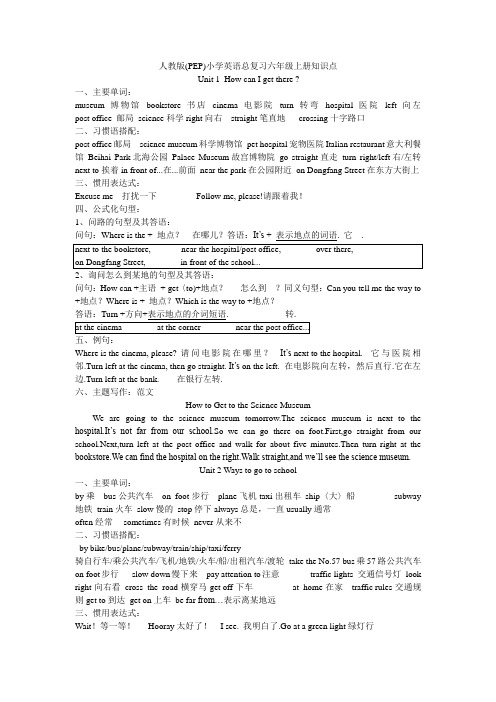
人教版(PEP)小学英语总复习六年级上册知识点Unit 1 How can I get there ?一、主要单词:museum博物馆bookstore书店cinema电影院turn 转弯hospital医院left向左post office 邮局science科学right向右straight笔直地crossing十字路口二、习惯语搭配:post office邮局science museum科学博物馆pet hospital宠物医院Italian restaurant意大利餐馆Beihai Park北海公园Palace Museum故宫博物院go straight直走turn right/left右/左转next to挨着in front of...在...前面near the park在公园附近on Dongfang Street在东方大街上三、惯用表达式:Excuse me 打扰一下Follow me, please!请跟着我!四、公式化句型:1、问路的句型及其答语:问句:Where is the + 地点?···在哪儿?答语:It’s + 表示地点的词语. 它···.2、询问怎么到某地的句型及其答语:问句:How can +主语+ get〈to)+地点?···怎么到···?同义句型:Can you tell me the way to +地点?Where is + 地点?Which is the way to +地点?答语:Turn +方向+表示地点的介词短语. ···转.五、例句:Where is the cinema, please? 请问电影院在哪里?It’s next to the hospital. 它与医院相邻.Turn left at the cinema, then go straight. It’s on the left. 在电影院向左转,然后直行.它在左边.Turn left at the bank. 在银行左转.六、主题写作:范文How to Get to the Science MuseumWe are going to the science museum tomorrow.The science museum is next to the hospital.It’s not far from our school.So we can go there on foot.First,go straight from our school.Next,turn left at the post office and walk for about five minutes.Then turn right at the bookstore.We can find the hospital on the right.Walk straight,and we’ll see the science museum.Unit 2 Ways to go to school一、主要单词:by乘bus公共汽车on foot步行plane飞机taxi出租车ship〈大〉船subway 地铁train火车slow慢的stop停下 always 总是,一直 usually 通常often经常sometimes 有时候 never 从来不二、习惯语搭配:by bike/bus/plane/subway/train/ship/taxi/ferry骑自行车/乘公共汽车/飞机/地铁/火车/船/出租汽车/渡轮take the No.57 bus乘57路公共汽车on foot步行slow down慢下来pay attention to注意traffic lights 交通信号灯look right向右看cross the road横穿马get off下车at home在家traffic rules交通规则 get to到达get on 上车be far from…表示离某地远三、惯用表达式:Wait!等一等!Hooray太好了!I see. 我明白了.Go at a green light 绿灯行Stop at a red light 红灯停Wait at a yellow light 黄灯等四、公式化句型:1、如何询问对方的出行方式:How do you come(to)+地点?你〈们〉怎么来···的?2、如何用must表示必须做某事:某人+must+动词原形〈+其它〉···必须···.3、告诫别人不要做某事的句型:Don’t +动词原形〈+其它〉.不要/别···.五、例句:How do you go to school? 你怎么去上学?Usually I go to school on foot. Sometimes I go by bus. 通常我步行去上学.有时候骑自行车去. How can I get to Zhongshan Park ? 我怎么到达中山公园?You can go by the No. 15 bus. 你可以坐15路公共汽车去. I am far from school now. 我现在离学校很远. My home is not far from our school. My home is near our school.我家离学校不远.六、主题写作:范文Don’t Be Against the Traffic RulesI go to school from Mondays to Fridays. I go to school by bike at 7:30 in the morning.I have to cross two busy roads.I know the traffic rules well.Slow down and stop at a yellow light.Stop and wait at a red light.Go at a green light.I always ride on the right side of the road.I am never against the traffic rules.Unit 3 My weekend plan一、主要单词:tomorrow明天film电影supermarket超市trip旅行tonight在今晚evening晚上/傍晚next week下周comic连环画杂志dictionary词典word单词post card明信片visit拜访二、习惯搭配:take a trip去旅行go for a picnic去野餐go to the cinema去看电影learn to swim学习游泳visit my grandparents看望我〈外〉祖父母get together 聚会go to the supermarket去超市go ice-skating去滑冰make a snowman堆雪人see a film看电影make mooncakes做月饼read a poem朗诵一首诗this weekend这周末Renmin Park人民公园next week下周this morning/afternoon/evening今天上午/下午/晚上next Wednesday下星期三三、惯用表达式:What about you?你呢?Here they are!它们在这儿!Can I help you?我能帮助你吗?Sounds great!听起来很棒!Have a good time!玩得开心!You too.你也是四、公式化句型:1、询问对方打算做什么的句型及其答语:问句:What are you going to do +其它?你/你们···打算做什么?答语:I’m/We’re going to +动词〈短语〉原形+其它. 我/我们打算···.2、询问对方打算去哪儿的句型及答语:问句:Where are you going(+将来时间)? 你/你们打算〈···〉去哪儿?答语:I’m/We’re going〈to the)+地点. 我/我们打算去···.3、询问对方打算何时去做某事的句型及答语:问句:When are you going to +动词〈短语〉原形?你/你们打算什么时候···?答语:I’m/We’re going to +动词〈短语〉原形+将来时间. 我/我们打算···.五、例句:What are you going to do on the weekend? 你周末打算做什么?I’m going to visit my grandparents this weekend? 这个周末我打算去看望我的外祖父母. Where are you going this afternoon? 你今天下午打算去哪里?I’m going to the bookstore. 我打算去书店.What are you going to buy? 你打算去买什么?I’m going to buy a comic book. 我打算去买一本漫画书.六、主题写作:范文Let’s Have a Nice Day!Today is Saturday.Tomorrow morning I’m going to the bookstore with my friends.We are going to look for some good books.We all like reading books.We are going to have lunch in a restaurant.I like chicken,beef and vegetables.After lunch,we are going to the Summer Palace by bus.We are going to play near the Kunming Lake.Maybe we are going to row a boat on the lake.That will be great!We are coming back at 5 in the afternoon.Unit 4 I have a pen pal一、主要单词:studies学习(第三人称单数形式〉puzzle谜hiking远足二、习惯搭配:read stories读故事do kungfu练功夫fly kites放风筝play the pipa弹琵琶play sports进行体育活动climb mountains爬山listen to music听音乐sing English songs唱英文歌on a farm在一个农场里live in...住在···write an email to...给···写一封电子邮件on the playground在运动场上三、惯用表达式:Me too.我也是. Really?真的吗?四、公式化句型:1、询问某人爱好的句型及其答语:问句:What are sb.’s hobbies? ···有什么爱好?答语:主语+like/likes+动词-ing形式〈+其它〉. ···喜欢···.2、由do/does引导的一般疑问句及其答语:问句:Do/Does+主语+动词原形+其它?答语:Yes,主语+do/does. /No,主语+don’t/doesn’t.五、语法:1、动词变为动名词的规则:动词变为动名词,即是动词加ing.一般要遵循以下三条规则:(1)一般情况下,在动词的后面直接加ing.如:play—playing read—reading do—doing go—going(2)以不发音的字母e结尾的动词,要去掉不发音的字母e,再加ing.如:write—writing ride—riding make—making dance—dancing〈3)以单元音加单辅音结尾的重读闭音节,要双写最后一个辅音字母,再加ing.如:run—running swim—swimming put—putting sit—sitting2、关于第三人称单数:动词变为第三人称单数形式的规则:(1)在一个句子中,如果主语人称既不是你,也不是我,而是另外的一个人,这时的人称叫做第三人称单数.(2)在第三人称单词的句子中,动词要使用第三人称单词形式.(3)动词变为第三人称单数形式,要遵循以下规则:①一般情况下,在动词的后面直接加s.如:read--reads make—makes write—writes②以字母s, x, o , sh , ch结尾的动词,在词尾加es.如:do—does wash—washes teach—teaches go—goes pass—passes③以y结尾的动词分为两个情况,以元音字母加y结尾的动词,在词尾直接加s.如:play—plays buy--buys以辅音字母加y结尾的动词,要把y变为i,再加es.如:study--studies④以f , fe结尾的名词,先把f,fe变为v,再加-es.⑤特殊变化:have--has(4)在一个第三人称单数的句子中,只要句子中出现了does或者其否定形式doesn’t.该句子中的其他动词就要使用原形.(5)第三人称单数的肯定句在变为否定句时,在动词的前面加doesn’t.动词恢复原形.如:he lives in Beijing.---he doesn’t live in Beijing.(6) 第三人称单数的陈述句在变为一般疑问句时,用does开头,后面的动词也要变为原形.如:he lives in Beijing.---Does he live in Beijing?3、注意几个单词的变化: hobby(复数形式)—hobbies have to(同义词)—must六、反义词或对应词:get on(上车)---get off(下车) near(近的)—far(远的) fast(快的)—slow(慢的) because(因为)—why(为什么) same(相同的)—different(不同的) here(这里)---there(那里) east(东)---west(西) north(北)---south(南) left(左)---right(右) get on (上车)---get off(下车)近义词:see you---goodbye sure---certainly---of course七、主题写作:范文Li Ying’s HobbiesLi Ying likes English very much.She works hard at it.She reads English every morning.She likes speaking English .She likes listening to the radio,too.She watches TV only on Saturday evening.Does she like cooking Chinese food?No, she doesn’t.She likes doing word puzzles.She doesn’t like playing basketball.Her parents love her.All the teachers love her,too.She says her hobbies make her happy.Unit 5 What does he do?一、重点单词:factory工厂postman邮递员police officer警察fisherman渔民scientist科学家pilot飞行员coach教练businessman商人;企业家worker工人二、习惯搭配:by car/bus/bike/plane/boat乘小汽车/公共汽车/自行车/飞机/船go to work去上班study hard 努力学习stay healthy保持健康go home 回家lots of 许多go to the camp去度假营be good at...擅长···三、惯用表达式:Cool!酷!What about you?你呢?That’s nice.那真好. I see.我明白了.四、公式化句型:1、询问他人的职业的句型及其答语;问句:What does+主语〈第三人称单数〉+do? ···是做什么的?答语:He/She is a /an+职业名称. 他/她是一位···.2、询问他人的工作地点的句型及其答语:问句:Where does+主语〈第三人称单数〉+work?···在哪儿工作?答语:He/She works+〈表示地点的〉介词短语. 他/她···工作.3、询问他人的上班方式的问句及其答语:问句:How does +主语〈第三人称单数〉+go to work? ···怎么去上班?答语:He/She goes to work+交通方式. 他/她···去上班.by bike/bus/subway/plane/train/ship/ferry/...on foot五、一些由动词变化而来的职业名词:teach—teacher clean—cleaner sing—singer dance—dancer drive—driver write—write r TV report—TV reporter act—actor act—actress art—artist engine—engineer六、主题写作:范文I Love My FamilyHere is a photo of my family.There are four people in my family.They are my father,my mother, my brother and me.My father is a doctor.He works in a hospital.He goes to work by subway.My mother is a teacher.She works in a school near my home.She goes to work by bike.Look, the tall boy is my brother.He is older than me.He is a pilot.He’s in Beijing now.He goes there by plane.I am a student now.I love my family.Unit 6 How do you feel ?一、主要单词:angry生气的afraid害怕worried担心的;发愁的happy高兴的see a doctor看病more更多的wear穿deep深的breath呼吸〈名词〉count数数〈动词〉sad难过的二、习惯搭配:feel angry/ill/happy/sad感觉生气/不舒服/高兴/难过be afraid of...害怕···be angry with...与···生气take a deep breath深深吸一口气count to ten 数到十see a doctor看病do more exercise做更多的运动wear warm clothes穿暖和的衣服chase the mice追赶老鼠drink some drinks喝一些饮料have some popcorn吃一些爆米花三、惯用表达式:Here you are.给你. Wait for me.等我一下. Yum!太美味了!四、公式化句型:1、描述某人/某物害怕什么的句型:主语+be动词+afraid of +其他. ···害怕···.2、描述某人/某物与什么生气的句型:主语+be动词+angry with+其他. ···与···生气.3、询问某人怎么了的句型及其答语:问句:What’s wrong? What’s the matter(with you)? 怎么了?答语:某人+所处的状况.4、建议某人应该做某事的句型某人+should +动词〈短语〉原形+其他. ···应该···.五、做“对句子划线部分提问”试题时,一般应该遵循三个步骤:〈1〉. 确定与句子划线部分相应的特殊疑问词,并且特殊疑问词代替相应的划线部分. 〈2〉. 把特殊疑问词代替划线部分后的句子变成一般疑问句.〈3〉. 最后再把特殊疑问词提到句首.以上三个基本步骤可以用三个字来概括,即:定,问,提.例如: This is a book ?①This is what. ②Is this what ? ③What is this ?注意:句①②只是一种变化过程,不必写入试题中.句③才是试题所要求的形式和结果,必须写到试题上.以上三个步骤是对句子划线部分提问最基本的过程.六、主题写作:范文What Should You Do?When you fell sad or worried,what should you do ? Let me tell you.First you should take adeep breath .Then you should listen to some music.Next you will be relax ed.You won’t be so sad or worried.When you are afraid,what should you do? It’s easy.You should ask your friends for help.If you have friends with you,you won’t feel afraid.Try to be happy every day.英语疑问词what,how,who,why,where,when的用法.一、what 什么用来问是什么,叫什么,做什么等1. What’s your name? 你叫什么名字?2.What is in your box? 你的盒子里是什么?3. What’s your father?=What does your father do? 你爸爸是干什么的?一〉What time 什么时间用来问时间 What time is it? 几点了?二〉What colour 什么颜色用来问颜色 What colour is your bag? 你的书包是什么颜色?三〉What about 怎么样用来征求意见或询问感受等,大多用于承接上面的同样问题.1.What bout this pair of shoes? 这双鞋子怎么样?2.What about you? 你呢?3.What about your dad? 你爸爸呢?四〉What day 星期几用来问星期几 What day is it today/tomorrow? 今天/明天星期几?五〉What date 什么日期问具体的日期1.What’s the date today? 今天是几号? 2. What date is tomorrow? 明天是几号?六〉What …for为何目的用来问目的,在一定情况下可以与why互换What did you buy that for?=Why did you buy that? 你为什么要买那个?二、when 什么时候用来问时间When do you get up?你什么时候起床?三、where 哪里用来问地点1. Where is my ruler? 我的尺子在哪里?2. Where are you going to ? 你打算去哪里?3.Where are you from? =Where do you come from? 你是哪里人?四、which 哪一个用来问具体的哪一个1. Which season do you like best? 你最喜欢哪个季节?2.Which class are you in? 你在哪一个班?3.Which one is my pen?哪一支是我的钢笔?五、Who 谁用来问人物是谁1.Who is that boy?那个男孩是谁?2. Who are you going to with? 你打算和谁一起去?3. Who is that pretty lady?那个漂亮的女士是谁?六、whose 谁的用来问东西是谁的1. Whose bag is this? 这是谁的包?2.Whose bike is yellow? 谁的自行车是黄色的?七、 why 为什么用来问原因1.Why do you like spring? 你为什么喜欢春天?2. Why did you go there? 你为什么去那里?八、 how 怎么样用来询问身体等状况1. How are you? 你好吗?2. How is your mother? 你妈妈好吗?一〉How old 几岁用来问年龄 How old are you? 你几岁了?二〉How long 多长用来问长度 How long are your legs? 你的腿多长?三〉How big 多大用来问物体的大小How big is your bedroom? 你的卧室多大?四〉How tall 多高用来问高度How tall is your brother? 你弟弟有多高?五〉How heavy 多重用来问重量 How heavy are you? 你有多重?六〉 How far 多远用来问路程 2 How far is it from here? 从这儿去有多远?七〉How many 多少用来问数量 How many apples do you have? 你有多少苹果?八〉How much 多少钱用来问价格how much is this dress? 这个连衣裙多少钱?九〉How about 怎么样用来征求意见或询问感受等,大多用于承接上面的同样问题,用法与what about相同1. How about you? 你呢?2. How about that shirt? 那件衬衣怎么样?。
PEP小学六年级上册英语知识点归纳

PEP小学六年级上册英语知识点归纳PEP六年级上册知识点归纳Unit1 How can I get there?XXX)post office邮局XXXturn left左转turn right右转places:。
cinema电影院地点)。
bookstore书店go XXXcrossing十字路口supermarket超市school学校一、描述某地点所处位置的短语near在…。
附近next to与…。
相邻XXX在…。
旁边in front of在……前面XXX在…。
后面XXX在…。
之间2、问路1.Where is the cinema。
please?请问电影院在哪儿?XXX在医院的旁边。
XXX在学校的前面.XXX在公园的背面It’XXX在植物园的邻近.XXX.离这儿很远.2.Excuse me。
is there a cinema near here请问这附近有电影院吗?Yes。
there is。
/No,there isn’t.有./没有。
3.How can I/we get there?我怎样到那儿?XXX left XXX到书店左转4.How can I get to the hospital?我该如何抵达病院呢?Take the No.57 bus.乘坐第57路公汽。
By the No。
57 bus.注意:到那儿get。
there到某地get to。
Canada/XXX二、指引路1.You can take the No.32 bus.你可乘坐32路公交车去那儿.注意:You can go by the No.32 bus.与上句意思一样,只是说法不同。
2.Go straight and turn。
left at the。
bookstore.先直行然后在书店那儿左转弯。
3.Turn right/ left at the …在…地方向右/左转.三Is it far from here?离这儿远吗?Yes。
pep六年级上册1至3单元知识点
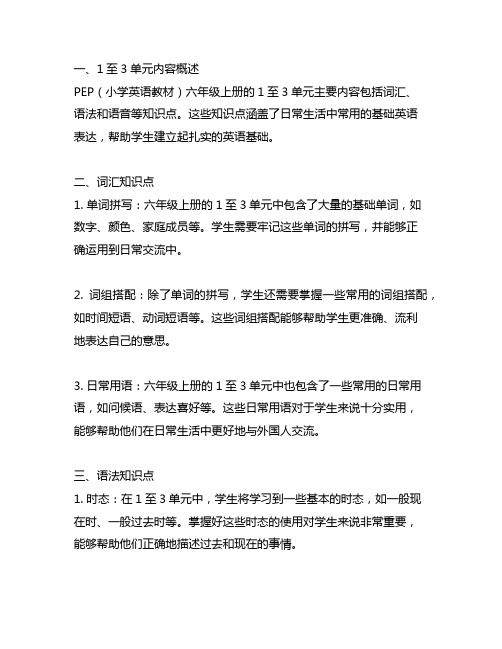
一、1至3单元内容概述PEP(小学英语教材)六年级上册的1至3单元主要内容包括词汇、语法和语音等知识点。
这些知识点涵盖了日常生活中常用的基础英语表达,帮助学生建立起扎实的英语基础。
二、词汇知识点1. 单词拼写:六年级上册的1至3单元中包含了大量的基础单词,如数字、颜色、家庭成员等。
学生需要牢记这些单词的拼写,并能够正确运用到日常交流中。
2. 词组搭配:除了单词的拼写,学生还需要掌握一些常用的词组搭配,如时间短语、动词短语等。
这些词组搭配能够帮助学生更准确、流利地表达自己的意思。
3. 日常用语:六年级上册的1至3单元中也包含了一些常用的日常用语,如问候语、表达喜好等。
这些日常用语对于学生来说十分实用,能够帮助他们在日常生活中更好地与外国人交流。
三、语法知识点1. 时态:在1至3单元中,学生将学习到一些基本的时态,如一般现在时、一般过去时等。
掌握好这些时态的使用对学生来说非常重要,能够帮助他们正确地描述过去和现在的事情。
2. 语法结构:学生还需要掌握一些基本的语法结构,如肯定句、否定句、疑问句等。
这些基本的语法结构是构建语言表达能力的基石,对学生的语言能力提升有着重要的作用。
四、语音知识点1. 发音准确性:在1至3单元中,学生将学习一些基础的英语发音规则,包括元音、辅音的发音技巧等。
通过反复练习,帮助学生提高发音的准确性,使他们能够更加清晰地表达自己的意思。
2. 语音连读:学生还需要学习一些基本的语音连读规则,如连读音、重读音等。
这些规则能够帮助学生更好地理解和模仿地道的英语发音,提高他们的口语表达能力。
五、总结PEP六年级上册的1至3单元涵盖了大量的英语基础知识,包括词汇、语法和语音等方面。
通过系统的学习和练习,学生能够建立起扎实的英语基础,为今后的英语学习打下坚实的基础。
这些知识点也是学生未来学习更复杂英语知识的基础,对于学生的英语学习之路具有重要的意义。
在前面的内容中,我们已经对PEP六年级上册1至3单元的知识点进行了概述,包括词汇、语法和语音等方面。
- 1、下载文档前请自行甄别文档内容的完整性,平台不提供额外的编辑、内容补充、找答案等附加服务。
- 2、"仅部分预览"的文档,不可在线预览部分如存在完整性等问题,可反馈申请退款(可完整预览的文档不适用该条件!)。
- 3、如文档侵犯您的权益,请联系客服反馈,我们会尽快为您处理(人工客服工作时间:9:00-18:30)。
Book6 A Unit 1 How Do You Go There ?一. 知识点归纳(一)、 词汇bike ( 自行车乘坐)公共汽车(脚) 火车(怎样) 飞机(上学)轮船)地铁) ( 交通工具前加by , 表示乘坐但步行要用on foot )fifth 第五 remember 记住 find 找到difference 不同 same 相同的 every 每个 所有的三会 country 国家 mean 意思是 drive 驾驶right 右边的 side 边 England 英国Australia 澳大利亚 however 但是 left 左边的if 如果 must 必须(二)、重点句型① 询问交通方式用疑问代词how⏹ —— How do you go to school ? 你怎样去上学?—— I go to school on foot . 我走路去上学。
⏹ —— How do you go to Canada ? 你怎么去加拿大。
—— I go by plane . 我坐飞机去。
⏹ —— How does your father go to work ? 你父亲怎样去上班?—— He goes to work by subway . 他坐地铁去上班。
② 询问地点,用疑问代词where⏹—— Where is your home ? 你家在哪里? —— It’s near the post office . 在邮局旁边。
⏹ —— Where are the teachers ? 老师们在哪儿?—— They are in th e teacher’s office . 在老师的办公室。
③ 问路⏹ —— How can I get to Zhongshan Park ? 我怎么去中山公园?—— You can go by the No.1 bus. You can take the No .1 bus .④ 交通规则(traffic rules )⏹Stop at a red light . 红灯停 ⏹Wait at a yellow light . 黄灯停 ⏹Go at a green light . 绿灯行 ⏹In China and the US , drivers drive on the right side of the road . 在中国和美国,司机靠右行驶。
⏹ In England and Australia, however, drivers drive on the left side of the road.但是在英国和澳大利亚,司机靠左边行驶。
Book 6 A Unit 2 Where is the science museum?词汇library 图书馆 north (北) post office 邮局hospital 医院places: cinema 电影院(地点) bookstore 书店 (东) east west (西)science muse科学博物馆bank 银行school 学校south(南)supermarket 超市shoe store 鞋店where 在哪里 pleas请 next to 与…相邻right 右边,正确的 left 左边straight成直线地 then 然后 turn转弯excuse me 对不起 want 想要a pair of 双minute分钟 tell 告诉 take乘坐far 远 after school 放学以后 get off上车 get on下车twelfth 第十二 party聚会;晚会 start 开始 buy买句型一、问路1.Where is the cinema, please? 请问电影院在哪儿?next to the hospital. 在医院的旁边。
in front of the school. 在学校的前面.behind the park 在公园的后面It’s near the zoo. 在动物园的附近.on the right/left of the bookstore. 在书店的左/右边.east of the bank. 在银行的东边.far from here. 离这儿很远.2. Excuse me, is there a cinema near here 请问这附近有电影院吗?Yes, there is. 有.3. How can I get to the hospital? 我该怎样到达医院呢?You can go …二、指引路1. You can go by the No.312 bus. 你可乘坐312路公交车去那儿.2. Get on / off at the …在…地方上车/ 下车.3. Walk straight for three minutes. 向前直走在分钟.4. Turn right/ left at the …在…地方向右/ 左转.5. Walk east/ west/ south/ north for … minutes.朝东/ 西/南/北/ 走…分钟.三 Is it far from here? 离这儿远吗?Yes, it is. / No, it isn’t.Book6 A Unit 3 What are you going to do?一.知识点归纳(一)、词汇四会next week 下周newspaper 报纸t his morning 今天上午comic book漫画书Time this afternoon 今天下午magazine杂志(时间 ) this evening 今天晚上dictionary 字典tonight 今夜post card 明信片tomorrow 明天take a trip去旅游theme park 主题公园activities buy some fruit买一些水果 others pet shop宠物店(活动)go to the cinema 去看电影(其他)fruit stand 水果摊visit the Great Wall参观长城shoe store鞋店read a magazine about plants阅读有关植物的杂志shop商店三会:busy忙碌的together一起地 need需要else其他二、重点句式和句型:本单元中出现的一个重点语法项目是一般将来时:表示将要发生的动作或状态,常和表示将来的时间连用。
构成:陈述肯定句:be going to + V原+ 其他否定句:be + not going to + V原+其他一般疑问句:Be+ 主语+ going to + V原+其他特殊疑问句:特殊疑问词+ 一般疑问句?E.g. I am going to the bookstore by bus this afternoon.I’m not going to the bookstore by bus this afternoon. Yes, I am.Are you going to the bookstore by bus this afternoon?No, I’m not.What are you going to do this afternoon?Where are you going this afternoon?How are you going to the bookstore this afternoon?When are you going to the bookstore by bus?三、重点句型:1. I’m going to have a busy weekend! 我将要度过一个繁忙的周末。
2. That will be fun!那将会很有意思。
3. What else? 还要什么?4. ----What are you going to do in the future?你将来想干什么?-----I’m going to be a science teacher one day.我想将来有一天当科学老师。
----- What about you ?你呢?-----I want to be a computer expert in the future. 我想当个电脑专家。
Book 6A Unit 4 I have a pen pal知识点归纳:一.本单元主要是谈论某人的兴趣爱好。
二.语法是动词的-ing形式和动词的第三人称单数形式。
三.词汇: ride a bike (rid ing a bike) 骑自行车dive (div ing ) 跳水hobby play the violin (play ing the volin) 拉小提琴(爱好) make kites (mak ing kites ) 制作风筝collect stamps (collect ing stamps) 集邮live (live s) 居住,住teach (teach es) 教go (go es) 去三单 watch (watch es) 看read (read s) 读do (do es)其他:show(展览) pen pal(笔友) dear (亲爱的) twin(双胞胎之一)look (看上去) fun (快乐,乐趣) with(同…)四.句型:1.询问某人的爱好:----What’s your hobby? 你的爱好是什么?----I like collecting stamps. 我喜欢集邮2. 表示征求别人意见:(1)----what about you ? 你呢?----Me too. 我也是。
(2)--- Let’s go together. 让我们一起去吧。
(3)---- Can he go with us?----- Sure!五.语法:一般现在时的用法(1)表示经常或习惯性的动作或状态,常与everyday /norning /beening , often, usually ,always 等状语连用。
如: We do morning exercises every day.He usuallly goes to school by bike.(2)表示主语的特征或能力。
如: Our school is beautiful.结构:陈述句:主语+动词+其他。
如: Miss white teaches English.一般疑问句:Do/ Does +主语+ 动词原形+其他?如: Does Miss White teach English?肯否定回答:Yes,she does ./ No, she doesn’t .Book6 A Unit 5 What does she do ?一、知识点归纳(一)词汇四会歌手香港)作家公司)an actor ( 男演员工厂)an actress ( 女演员设计)an artist ( 画家小提示)电视台记者帮助) an engineer (工程师金钱)an accountant ( 工程师好,对 )男警察从…获得乐趣) salesperson ( 销售员旅游者 )清洁工路,道)work ( 工作摩托车)where ( 在哪里警察部门)其他表示职业的词:worker ( 工人) doctor ( 医生) nurse (护士) teacher ( 老师) student ( 学生) drive (司机、驾驶员)(二)重点句型①询问职业●—— What does he do ?/What is he ? 他是做什么的?—— He is a doctor. 他是一个医生。
